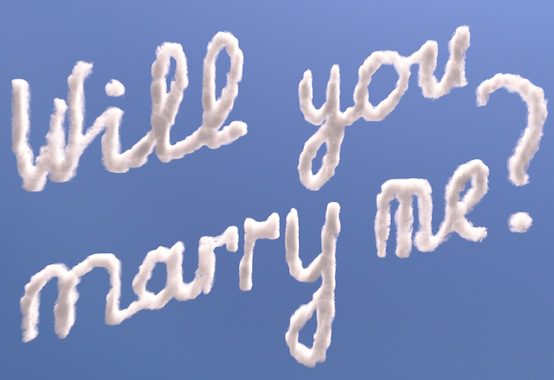Engagement Inflation

In 2012 a Canadian faked his arrest and deportation, an American faked a near-crash in an airplane, and a Russian faked his own death… all in order to get a girl to say “yes.”
These guys may have been extreme. But they’re simply the (fake-)bleeding edge of a trend toward more elaborate, public, and bizarre proposals. You can now hire an “engagement planner” to help you craft a proposal which truly speaks to the individual character of your intended. You can propose by flash mob and create a website just to commemorate the luxe setting of your engagement.
Engagement inflation isn’t a genuine problem, the way wedding inflation is. Wedding inflation—the ballooning costs and skyrocketing importance of the Bride’s Big Day—actually creates an additional financial barrier to marriage. It makes couples who love and trust one another feel that they aren’t capable of having a “good enough” wedding, so they must not be ready to marry. It’s a poignant response to the divorce revolution, as couples hope a huge wedding will prove that they are deeply invested in their relationship and truly mean to “only do this once”; but it also helps focus attention on the wedding rather than the marriage. It feeds entitlement, narcissism, and stress which can turn would-be princesses into Bridezillas.
Compared to wedding inflation, engagement inflation is just the frosting on the decadent cake. But there are a few reasons to reject this trend. Here are four reasons not to photograph your proposal for Facebook, and not to propose by faking anybody’s death:
- Huge public proposals often bully the woman into accepting. That may be the point! Here’s the resurrected Russian, Alexey Bykov, explaining why he faked a deadly car crash to woo his woman: “I wanted her to realize how empty her life would be without me and how life would have no meaning without me.” I… am not convinced that she is the one who derives too much meaning from this relationship. But really, everybody knows that flashy public proposals are a pressure tactic, whether they’re intended as such or not. And accepting a proposal can feel like getting on a roller coaster: The machine has started and you’re strapped in for the duration. Instead of choosing this person for better or for worse, you’re just going through with the marriage because it would be too hard to stop it.
- A bigger engagement may signal a longer engagement. This is purely speculative, but are you really going to want to plan two splashy shows back-to-back? And longer engagements, especially ones without a set wedding date, lend themselves to endlessly-retreating marriage horizons. It’s easy to feel like you’re basically already married, since you’ve already made a big public show of your choice of one another. So you can hang out in the foyer of commitment, with plausible deniability in case you change your mind. Getting engaged isn’t quite as terrifying as marriage, for divorce-traumatized young adults—but that’s because it isn’t quite as real.
- Some part of a couple’s life should be truly private. A marriage is a public pledge; it’s also, ideally, a conspiracy of the couple. It’s a place where they can be honest and vulnerable because they are not being watched and judged by others. The wedding is for your family and the outside world. Why not let the proposal be for the two of you? My best friend suggested that a public proposal requires looking at yourself “in the third person.” Why not let your proposal be second-person?
- Some part of everybody’s life should be lived off social media.
I’m not proposing (…sorry) a hard and fast, eternal rule. Public engagements have a long and honorable history. They can be conducted on the church porch, for example, signaling the couple’s intentions for all to see and inviting God to guide them as they move toward marriage. And of course demi-public engagements in parks, restaurants, or a parental home are normal rather than inflated. Engagement inflation is mostly a matter of degree—although it can also be a difference in kind, as when the proposal focuses on the couple’s self-perceived uniqueness or on the cleverness (or desperation) of the proposer.
Again, most of this is harmless. And of course the publicity of engagements also derives simply from the normal, lovely human desire to share our happiness with others. I’ve seen engagement photos from Facebook friends who, I’m confident, will go on to make strong and beautiful marriages. But if you ask, Why have engagements gotten bigger?, I think you’ll find that most of the answers aren’t so reassuring.
Eve Tushnet is a writer in Washington, DC. Follow her on Twitter.
Comments